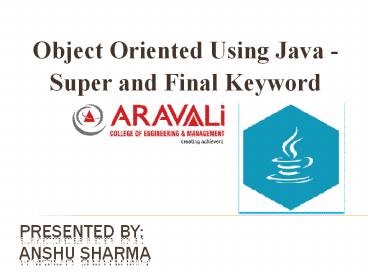Ansh_s (1) - PowerPoint PPT Presentation
Title:
Ansh_s (1)
Description:
www.acem.edu.in – PowerPoint PPT presentation
Number of Views:3
Title: Ansh_s (1)
1
Presented ByAnshu Sharma
- Object Oriented Using Java -
- Super and Final Keyword
2
Super Keyword in java
- The super keyword in Java is a reference variable
which is used to refer immediate parent class
object. - Whenever you create the instance of subclass, an
instance of parent class is created implicitly
which is referred by super reference variable. - It is used to call superclass methods, and to
access the superclass constructor. - The most common use of the super keyword is to
eliminate the confusion between superclasses and
subclasses that have methods with the same name.
3
Use of super keyword
- super can be used to refer immediate parent class
instance variable. - super can be used to invoke immediate parent
class method. - super() can be used to invoke immediate parent
class constructor. - super () calls the parent class constructor with
no argument. - super.methodname calls method from parents class.
- It is used to call the parents class variable.
4
Use of Super Keyword
5
Examples 1) super is used to refer immediate
parent class instance variable.
- We can use super keyword to access the data
member or field of parent class. It is used if
parent class and child class have same fields. - class vehicle
- String color"white"
- class car extends vehicle
- String color"black"
- void printColor()
- System.out.println(color)//prints color of
car class - System.out.println(super.color)//prints color of
vehicle class
6
Example contd.
- class TestSuper1
- public static void main(String args)
- car cnew car()
- c.printColor()
- In the above example, vehicle and car both
classes have a common property color. If we print
color property, it will print the color of
current class by default. To access the parent
property, we need to use super keyword.
7
2) super can be used to invoke parent class
method
- The super keyword can also be used to invoke
parent class method. It should be used if
subclass contains the same method as parent
class. In other words, it is used if method is
overridden. - class person
- void eat()System.out.println("eating...")
- class student extends person
- void eat()System.out.println("eating ...")
- void read()System.out.println(Reading...")
- void work()
- super.eat()
- read()
8
Example contd.
- class TestSuper2
- public static void main(String args)
- student dnew student()
- d.work()
- In the above example person and student both
classes have eat() method if we call eat() method
from student class, it will call the eat() method
of student class by default because priority is
given to local.
9
3) super is used to invoke parent class
constructor.
- The super keyword can also be used to invoke the
parent class constructor. Let's see a simple
example - class person
- person()
- System.out.println(person class")
- class student extends person
- student()
- super()
- System.out.println(student class")
10
Example contd.
- class TestSuper3
- public static void main(String args)
- student dnew student()
- Output
- person class
- Student class
- As we know well that default constructor is
provided by compiler automatically if there is no
constructor. But, it also adds super() as the
first statement.
11
Final Keyword In Java
- The final keyword in java is used to restrict the
user. The java final keyword can be used in many
context. Final can be - A variable
- A method
- A class
- The final keyword can be applied with the
variables, a final variable that have no value it
is called blank final variable or uninitialized
final variable. It can be initialized in the
constructor only. The blank final variable can be
static also which will be initialized in the
static block only.
12
Final Keyword in Java
13
1) Java final variable
- If you make any variable as final, you cannot
change the value of final variable(It will be
constant). - Example of final variable
- There is a final variable speedlimit, we are
going to change the value of this variable, but
It can't be changed because final variable once
assigned a value can never be changed.
14
Example
- class Bike9
- final int speedlimit90//final variable
- void run()
- speedlimit400
- public static void main(String args)
- Bike9 objnew Bike9()
- obj.run()
- //end of class
- Output
- Compile Time Error
15
2) Java final method
- If you make any method as final, you cannot
override it. - Example of final method
- class Bike
- final void run()
- System.out.println("running")
- class Honda extends Bike
- void run()
- System.out.println("running safely with 100kmph")
16
Example contd.
- public static void main(String args)
- Honda honda new Honda()
- honda.run()
- Output
- Compile Time Error
17
3) Java final class
- If you make any class as final, you cannot extend
it. - Example of final class
- final class Bike
- class Honda1 extends Bike
- void run()System.out.println("running safely wi
th 100kmph") - public static void main(String args)
- Honda1 honda new Honda1()
- honda.run()
- Output
- Compile Time Error
18
- Thankyou































